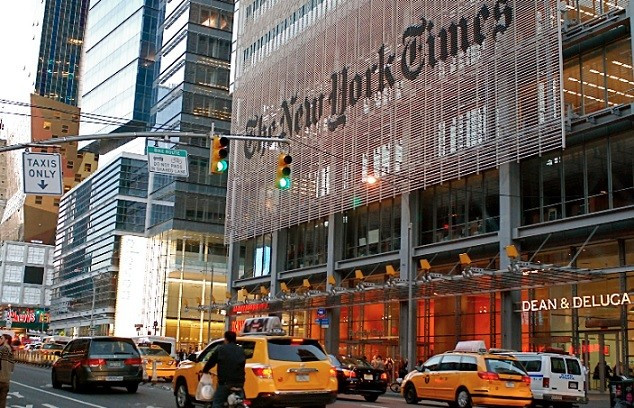New York Times 'Airbrushes Details of Hawkish Israeli Stance' on Syria after Aipac Pressure
Powerful Israel lobby group in Washington accused of encouraging self-censorship of Syria reprisal report.

The New York Times has come under fire for "self-censoring" its own reporting on the Syria crisis after pressure from Israel's powerful lobbying group in Washington, the American-Israeli Public Affairs Committee (Aipac).
The newspaper ran a news story on 2 September outlining President Obama's efforts to secure congressional backing for military intervention in Syria, in which it broached the sensitive issue of Israel's position on the possibility of imminent air strikes.
The report detailed the president's meetings with influential senators and members of Congress, and with committees including the Senate Armed Forces Committee, the Senate Foreign Relations Committee and the Senate Select Committee on Intelligence, before moving on to Aipac and its agenda.
It quoted one unidentified administration official who described Aipac as "the 800-pound gorilla in the room".
The report went on to quote the same official describing the hardening pro-intervention position of politicians it termed "Aipac's allies in Congress".
The official characterised the view taken by Aipac's allies as "If the White House is not capable of enforcing this red line... we're in trouble."
Later that day, the newspaper updated the article. It said: "Administration officials said the influential pro-Israel lobby group Aipac was already at work pressing for military action against the government of President Bashar al-Assad, fearing that if Syria escapes American retribution for its use of chemical weapons, Iran might be emboldened in the future to attack Israel."
The report appeared on the NYT.com website on 2 September, but had gone through 11 published changes by 4 September.
The final version of the piece contained no reference to Aipac or the action it had been pushing for.
The edited version raised concerns among analysts that the paper, the nation's most eminent news organ, had edited its own report for reasons unrelated to accuracy or importance.
The war the lobby really craves
Political commentators suspected that the views candidly reflected Aipac's position but were removed as the lobby group did not wish to see its true thinking reported in the national media.
MJ Rosenberg, a former foreign policy adviser to Democrats in the Senate and Congress, was among the first to raise concerns over the omission.
"Obviously the White House and/or Aipac did not want to be caught saying that the reason we are attacking Syria is to show Aipac that we are serious about the war the lobby really craves: Iran," wrote Rosenberg.
"But there it is. Or was. Aipac censorship even applies to the Times. Only in America - not Israel, where Aipac's power does not extend to Ha'aretz."
However, the colourful gorilla reference seemed to have survived, albeit in an airbrushed form, Rosenberg pointed out.
"Its only remnant is in the Times search engine. If you put in 'gorilla', it points you to this story. But the gorilla ain't there," he wrote on his site under the headline "New York Times Deletes This Paragraph In Which White House Says AIPAC Is Key To War".
AIPAC is renowned as an influential body that lobbies for Israel's interests in Washington. Its power and financial clout have been likened to that of the National Rifle Assication.
Steven Rosen, Aipac's former foreign policy director, told New Yorker magazine: "You see this napkin. In 24 hours, we could have the signatures of 70 senators on this napkin."
In the same interview he went on to describe lobbying as "like a night flower: it thrives in the dark and dies in the sun".
Aipac finally came out in support of air strikes a day after the New York times story.
Supporters said they had privately made it known that they supported US action but preferred the debate to focus on US national security rather than on Israel's interests, reflecting Israeli sensitivities in being seen as pushing for Washington to act, the Jerusalem Post reported.
Aipac called on Congress to "support the president's effort to protect American security interests".
The statement, signed by Aipac president Michael Kassen and chief executive Howard Kohr, added: "America must also send a forceful message of resolve to Iran and Hezbollah - both of whom have provided direct and extensive military support to Assad."
Meanwhile, a speech by Iran's former president, Akbar Hashemi Rafsanjani, has shone a light on behind-the-scenes political schisms within the Iranian regime over its support for Assad's regime.
Rafsanjani was recorded urging the Iranian leadership to reconsider its support for the Syrian regime and hold Assad responsible for chemical weapons attacks in Damascus in which more than 1,400 people are believed to have died.
"The people of Syria were subjected to chemical weapons by their own government and now they have to expect a foreign invasion," said Rafsanjani, the head of Iran's powerful Expediency Council.
The remarks sparked a national outcry.
Marzieh Afkham, Iran's foreign ministry spokeswoman, said the comments had been "distorted".
But Rafsanjani's words were later confirmed when an audio recording of his speech emerged on 3 September, the Financial Times reported.
© Copyright IBTimes 2025. All rights reserved.





















